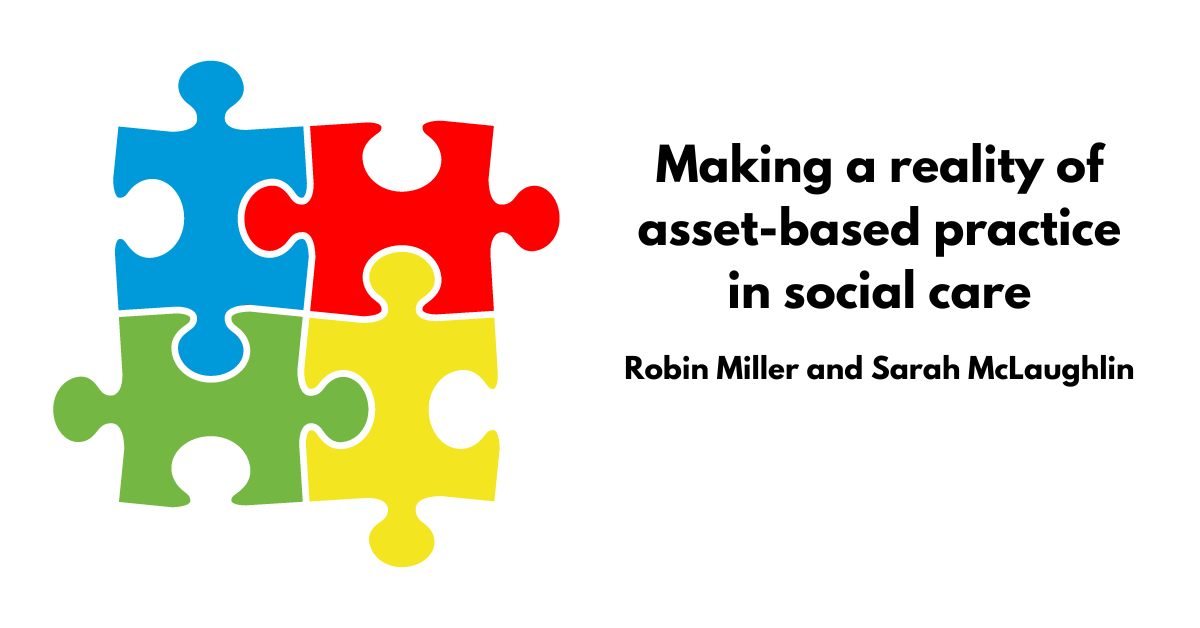Asset Based Approaches
Project Background
An asset (or strengths) based approach is a generic term which describes a fundamental shift in the design and delivery of health and social care services. Rather than focusing on the challenges which people face and how professionals and care services can address these challenges, an asset-based approach starts with what is important to the individual and explores the personal, family and community resources available to achieve their desired outcomes.
Formal services look to complement but not replace or duplicate these informal resources. Professional opinion is considered alongside (but not above) the person’s own view of their challenges and opportunities. Common asset-based approaches used within social care and health in the UK include – community navigation, social prescribing, link workers, local area co-ordination, and community development. Whilst there are some differences between these, they are based on the same principles.
The rationale for asset-based approaches have been endorsed by governments across the UK. Embedding these in practice has though proven to be extremely challenging. This Demonstrator project worked with an existing asset-based community development project based in Mid and East Antrim to better understand what has enabled them to achieve positive outcomes, identify how their approach could be further improved, and what other communities can learn from their experiences.
Within the project, IMPACTAgewell® Officers meet older people in their own homes to learn what matters to them and discuss options to improve their social situation and health conditions. Where appropriate and with their agreement, the older person is introduced to community groups providing relevant support and networks. When a community group engages with an older person, they are provided a fee to help cover their costs. Older people are referred into IMPACTAgewell from GPs, social workers, community pharmacies and community organisations. Locality Hub meetings bring together these professionals with the link workers to share information and learn lessons relating to individual older people and needs of the population in their area.
This report provides insights from the IMPACT Demonstrator project on how asset-based principles can be implemented and sustained.
Pre-project Evidence on Asset Based Approaches
Research regarding asset-based approaches with older people can be drawn from different fields of practice and study – these include strengths-based working in adult social work and social care, community development and social prescribing. There are differences in the contexts, focus and practice models used, yet reviews of research within these fields report similar insights. While the evidence base is not yet conclusive, there are strong indications of positive impacts regarding people’s mental wellbeing, self-confidence, and reduced isolation. Outcomes are less clear in relation to reducing people’s access to, and long-term reliance on, formal health and social care services and therefore the overall cost-effectiveness of asset-based approaches. In relation to IMPACTAgewell, an independent evaluation estimated that every £1 spent generated a saving of £2.38 through reduced demand on GPs and A&E.
Elements of asset-based approaches seen from research as being important to improve outcomes are:
- Link workers who know local resources; have necessary connections & relationships; and can communicate effectively with professionals, voluntary organisations and people and families.
- Efficient process through which professionals can connect people to link workers supported by digital resources and record systems.
- Sufficient range of affordable, accessible, and responsive community- based activities.
- Emotional and practical support for people engaging with community activities.
- On-going development of resources through engagement with communities and local inter-agency collaboration
Asset Based Project Activity
The project was led by two steering groups – a Community Group involving older people and voluntary sector organisations, and a Practice Group involving professionals, health and social care organisations, funders, and networks.
The steering groups set out key implementation questions to be explored initially through research, practice and lived experience evidence. Insights from evidence were discussed at a World Café event involving professionals, older people, and community groups.
A theory of change was developed following the event which identified these areas for development: engagement from professionals, including GPs, social workers and pharmacists; accessibility to older people from minority communities; strengthening collaboration with and across the community sector; and widening learning and impact.
Asset based approaches in hospital discharge
Recognising the challenge of delayed hospital discharges, IMPACTAgewell® initiated a pilot project in partnership with social workers at the Inver Intermediate Rehabilitation Care unit in Larne. The pilot aimed to reduce time older people spent in rehabilitation wards and increase their confidence in returning home. An IMPACTAgewell® Officer attended weekly meetings with Community Discharge Facilitators to discuss people who might benefit from support. The older person was then visited in the ward environment to have the first conversations around potential options with six months support being provided post discharge by the IMPACTAgewell® Officer.
Engaging older people within minority communities
The World Café event in 2022 recognised that members of the growing ethnic minority population in Mid and East Antrim were not accessing support from IMPACTAgewell®. Criteria for the service were adjusted beyond older people living alone or with another older person, as older people from minority communities were isolated within the family home due to lack of local networks. Staff at IMPACTAgewell® were given training by the specialist local community agency, the Inter Ethnic Forum, on the composition and characteristics of the black and minority ethnic populations in the district. IMPACTAgewell® in turn provided information sessions to the Forum’s staff. The collaboration has led to the first referrals of older people from these communities. Many of them are facing multiple health conditions, and have a lack of understanding of how the NHS operates, and do not have the language skills needed to easily access services.
At the end of the project, a second World Café enabled stakeholders to reflect on the progress and learning. Through these discussions recommendations for future practice and policy were developed.
Project Outcomes
The Demonstrator project has highlighted the importance of all core elements of the IMPACTAgewell® approach (i.e. locality hubs, skilled and empathetic link workers, a community development approach, and activity based funding for community organisations to support individuals).
Home visits by link workers provide multiple benefits: tackling isolation, assessing living conditions, and providing a holistic view of an older person’s wellbeing. It has also confirmed stakeholders’ belief in the positive outcomes including reducing demand on health and social care services and lightening of workloads. The inter-professional hubs enable discussion about individual and community needs and sharing of best practice between professionals. Respectful relationships between professionals, the asset-based service, and the community organisations is key to successful outcomes.
To enable a community development approach to foster, there needs to be integration at a strategic level. This involves a shared approach to investing resources and how to balance issues of equity and individual need, and co-ordination of the different community initiatives. The community sector should be seen as a partner within strategic policy decisions. Secure funding for core infrastructure services such as community transport and to provide capacity for professional engagement is essential to provide continuity of support and collaboration.
Professional Engagement
- Professional engagement requires continual focus due to changes in personnel, structures and operational environments.
- Demonstrating value of asset-based approaches in different pathways helps professionals to appreciate relevance to their work.
- In-person contact between professionals and link workers facilitates trust and builds confidence in collaboration.
- Professional networks facilitate access to professionals and provide credibility for approach.
Reflecting Diversity
- Comparing referral data to population level data helps to pinpoint communities who are not accessing support.
- Developing partnerships with bodies which represent different communities identifies barriers and potential solutions.
- Training and support may be necessary for link workers to develop skills and confidence in supporting people from different cultures.
- Community development activity must consider the needs of minority communities.
- Awareness must be developed of indirect and passive discrimination in process and practices.
Expanding Reach
- Direct approaches to community groups proposing service partnerships are more effective than open calls.
- Backing social prescribing with fees per individual prescription helps to build capacity and meet costs of community sector
- Facilitating opportunities for community groups to meet with each other and link workers help to build relationships, encourage joint work, and developing new assets.
- Alternative funding models such as social finance can result in additional investment alongside public sector contracts
System Factors
- Community organisations should be involved in wider changes to structures, roles, and processes to maintain joint working and enable effective communication
- Strategic investment in community resources and navigator services needs to be co-ordinated across health and social care and complementary sectors.
- People who are new to a country will benefit from guidance on how the health and social care system and other services function.
- Instability in governance and strategic decision- making limit the capacity, morale, and planning processes of the community and statutory sectors.
Asset Based Project Reflections

General Practitioner
Northern Ireland
Community Pharmacist
Northern Ireland
Social Work Manager
Northern IrelandNews and Updates
Making a reality of asset-based practice in social care

Practitioners often find it difficult to implement asset-based approaches, including because of a lack of time. A project has examined how these barriers can be overcome to realise the benefits for older people – By Robin Miller and Sarah McLaughlin, IMPACT. This article was originally published on Community Care. There are many potential benefits of…
